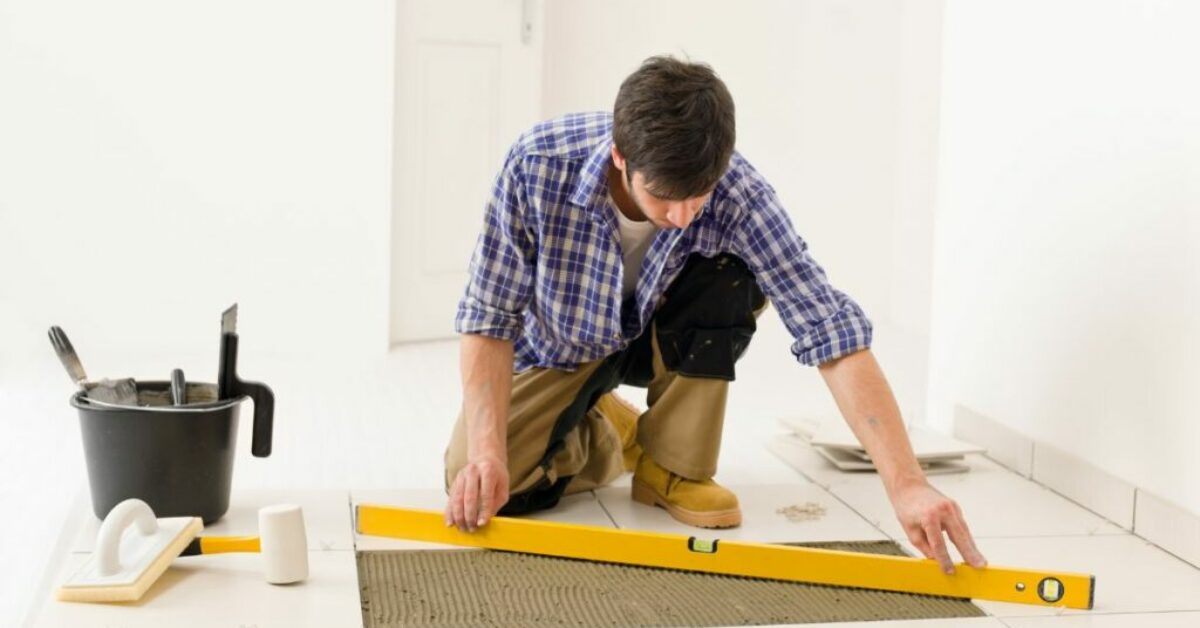How To Become A Tiler?
If you’re interested in the construction industry, you may have considered a career as a tiler. Tiling involves installing various materials, such as ceramic or stone tiles, in homes, businesses, and public constructions. Tiling is a skilled trade that requires proficiency in measuring, cutting, and laying tiles precisely. In this article, we’ll explore the steps to becoming a tiler, the skills needed for this career, what a tiler does, and the benefits of working in this field.
Steps To Becoming A Tiler
To become a tiler, you need to meet certain requirements and follow specific steps. Here are the essential steps you need to take:
- Educational Requirements
While it’s not mandatory to have a post-secondary education to become a tiler, having a high school diploma is usually required. Additionally, vocational and trade schools, community colleges, and apprenticeships may offer courses on tiling, which can help you acquire crucial knowledge and skills needed in the industry. These educational paths can be beneficial in helping you secure apprentice roles and getting into the industry faster.
At a vocational or trade school, you can expect to learn about the different types of tiles, adhesives, and grouts used in the industry. You’ll also learn how to read blueprints and create tile patterns. Community colleges may offer more in-depth courses, including business management, which can be useful if you plan on starting your own tiling business in the future. - Apprenticeship
An apprenticeship in tiling is typically structured and takes between two to four years to complete, depending on the requirements of your local or state government. During an apprenticeship, individuals work under the supervision of experienced tile installers, acquiring on-the-job training and expertise. Some apprenticeships also couple job training with classroom education.
During your apprenticeship, you’ll learn how to prepare surfaces for tiling, cut tiles to fit around obstacles, and install tiles in a variety of patterns. You’ll also learn how to work with different types of tiles, such as ceramic, porcelain, and natural stone. - Certification
Although certification isn’t a must-have for tile installers, it can help individuals stand out and get better-paying roles. Certification is offered by organizations such as the National Tile Contractors Association (NTCA), and it typically involves passing a series of practical and written assessments.
Having a certification can demonstrate to potential employers that you have the necessary skills and knowledge to perform high-quality work. It can also give customers peace of mind knowing that they are hiring a qualified and skilled professional.
In addition to certification, continuing education can also be beneficial for tile installers. Staying up-to-date with the latest industry trends and techniques can help you provide better service to your customers and stand out in a competitive market.
Skills Needed For Becoming A Tiler
While tiling is a skilled trade, some personal attributes and technical abilities are required for success in this career. Here are some of the essential skills you need as a tiler:
Attention To Detail
To be a successful tiler, you must be precise and detail-oriented. Measuring, cutting, and placing the tiles requires great attention to detail to ensure a perfect and professional finish. Missing an important detail can result in costly repairs or poor-quality work.
Attention to detail is crucial in ensuring that the tiles are laid correctly and that the patterns and designs are consistent. It is also important to pay attention to the type of tiles being used, as different materials may have different installation requirements.
Physical Fitness and Stamina
Tiling is a physically demanding job that may require lifting and carrying heavy tiles, bending, and kneeling for extended periods. You should, therefore, be physically fit and able to maintain your stamina throughout the day.
Physical fitness is essential in this trade, as it helps prevent injuries and ensures that the work is completed efficiently. Stamina is also crucial, as tiling projects can take several hours or even days to complete.
Problem-Solving Skills
Tiling may present challenges such as uneven surfaces, corner cuts, and tricky angles that require creative thinking, problem-solving skills, and logical reasoning. As a tiler, you should be able to come up with solutions to these challenges creatively.
Problem-solving skills are essential in tiling, as they help overcome the various challenges that may arise during the installation process. A good tiler should be able to assess the situation, identify the problem, and come up with a solution that produces the desired results.
In addition to these skills, a tiler should also possess good communication skills to interact effectively with clients and colleagues, as well as have a good understanding of safety procedures to ensure that the work environment is safe for everyone involved.
What Is A Tiler?
A tiler is a skilled construction worker who specializes in the installation of tiles on various surfaces. They are responsible for creating aesthetically pleasing and durable surfaces that can withstand the test of time. The job of a tiler requires precision, attention to detail, and a good eye for design.
When it comes to the materials used by tilers, there are a variety of options available. Ceramic tiles are a popular choice due to their durability and versatility. They come in a range of colors and patterns, making them suitable for a range of applications. Marble tiles, on the other hand, are a luxurious option that can add a touch of elegance to any room. Glass tiles are another option that can be used to create stunning visual effects.
A tiler may work on a variety of projects, from new construction to the renovation of older structures. In new construction, a tiler may be responsible for installing tiles in a variety of spaces, from bathrooms and kitchens to entryways and outdoor patios. In renovation projects, a tiler may be tasked with removing old tiles and installing new ones to update the look of a space.
When it comes to the installation process, a tiler must first prepare the surface on which the tiles will be installed. This may involve leveling the surface, removing any debris, and applying a layer of adhesive. The tiler will then carefully lay the tiles, ensuring that they are straight and level. Once the tiles have been installed, the tiler will apply grout to fill in the gaps between the tiles and give the surface a finished look.
Overall, the job of a tiler requires a combination of skill, creativity, and attention to detail. Whether working on a new construction project or a renovation, a tiler plays an important role in creating beautiful and functional spaces.
The Benefits of Working as a Tiler
Working as a tiler is an excellent career choice for those who enjoy hands-on work and creativity. Not only is it a skilled trade that provides job security, but it also offers high earning potential and opportunities for career advancement.
Job Security
As mentioned, tiling is a skilled trade that requires professionals to be on-site to install, repair, or renovate tiles. This means that there is always a demand for qualified tilers. With the growth of the construction industry, the demand for tilers is expected to increase further. This means that those who choose to pursue a career in tiling can rest assured that their skills will be in demand for years to come.
Furthermore, tiling is a trade that is not easily automated. While technology has advanced in many areas of construction, there is still a need for skilled tilers to ensure that tiles are installed correctly and efficiently. This means that tilers can feel secure in the knowledge that their job cannot be easily outsourced or replaced by machines.
High Earning Potential
One of the most significant benefits of working as a tiler is the high earning potential. While salaries can vary depending on the region, type of project, experience, and training, skilled tilers are known to earn high hourly wages and great benefits. Self-employed tilers can also benefit from higher earnings through their flexible billing structures and minimum overhead costs.
Additionally, many tilers have the opportunity to work overtime or take on additional projects, which can significantly increase their earnings. This means that those who are dedicated to their craft can earn a comfortable living while doing work that they enjoy.
Opportunities for Creativity
Tiling is an artistic and creative occupation that allows tilers to express their creativity through their work. With the multitude of tile materials available on the market, tilers have a vast range of design options to choose from, making each project unique. This variety makes tiling a fun and exciting career for the artistically inclined.
Furthermore, many tilers have the opportunity to work on high-end projects that require intricate and detailed designs. This means that those who enjoy challenging themselves creatively can find fulfillment in their work and take pride in their finished projects.
Career Advancement Opportunities
As a tiler, there are various career advancement opportunities available. These include becoming a supervisor, estimator, or even starting your tiling company. Tilings also opens doors to potential careers outside of the construction industry, such as teaching or working in tile manufacturing.
Furthermore, many tilers have the opportunity to specialize in a particular area of tiling, such as mosaic tiling or large-format tiling. This means that those who are passionate about a particular aspect of tiling can focus their career on that area and become experts in their field.
In conclusion, working as a tiler provides many benefits, including job security, high earning potential, opportunities for creativity, and career advancement. Those who are interested in pursuing a career in tiling can rest assured that their skills will be in demand for years to come, and they will have the opportunity to do fulfilling and challenging work that they enjoy.
Becoming a tiler requires dedication, hard work, and a desire to learn. While tiling can be a physically demanding career, it is a rewarding trade that offers plenty of opportunities for career advancement, job security, and creativity. If you have an eye for detail, love working with your hands, and enjoy problem-solving, then tiling may be the career for you.




